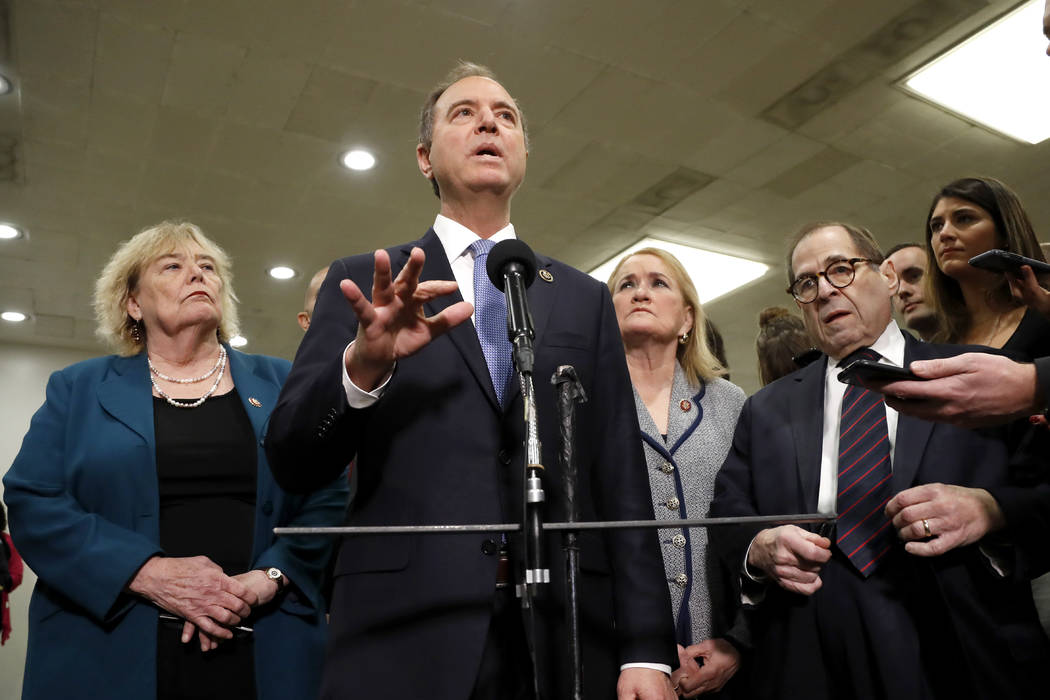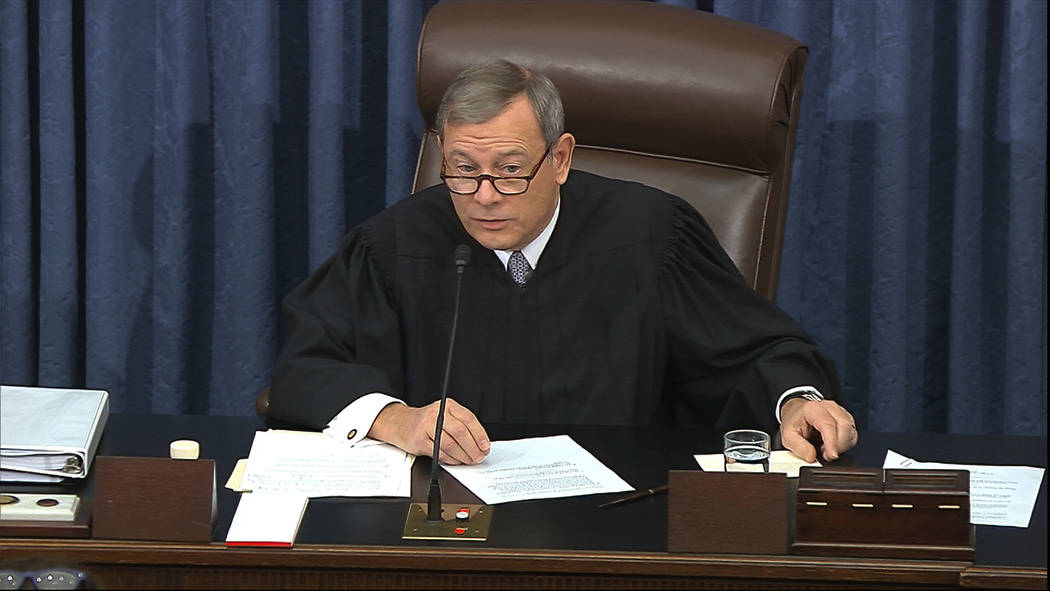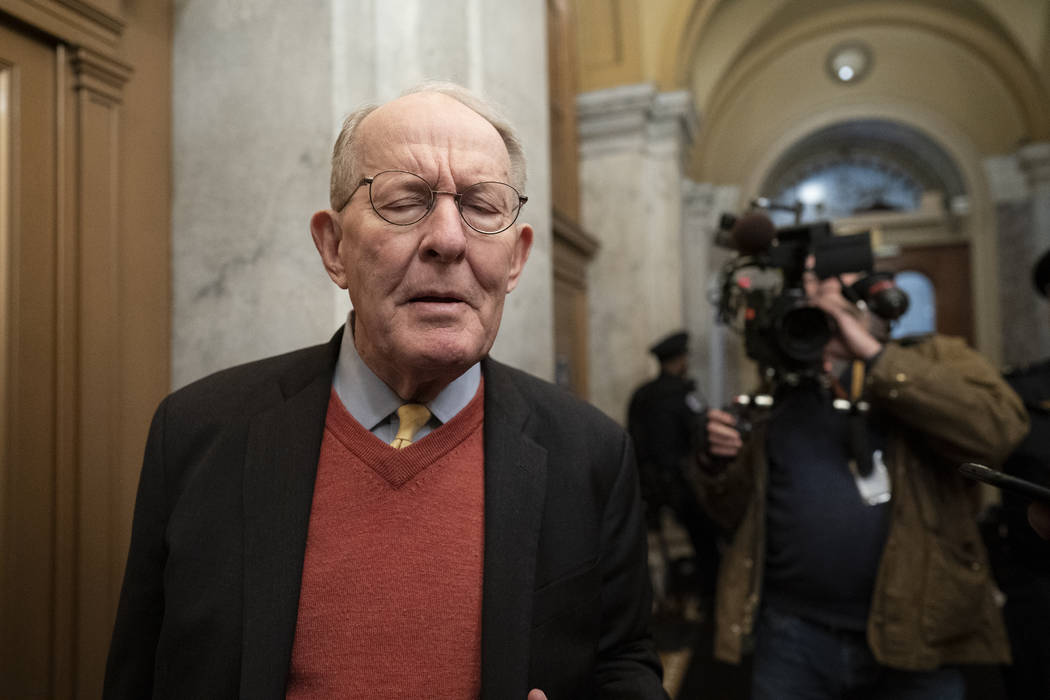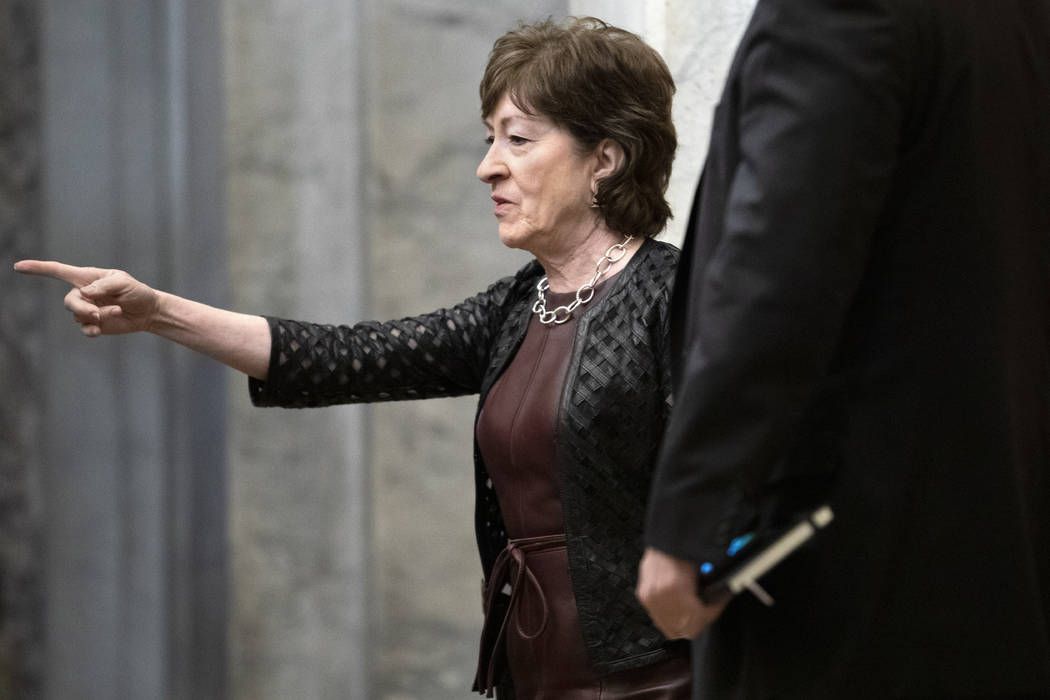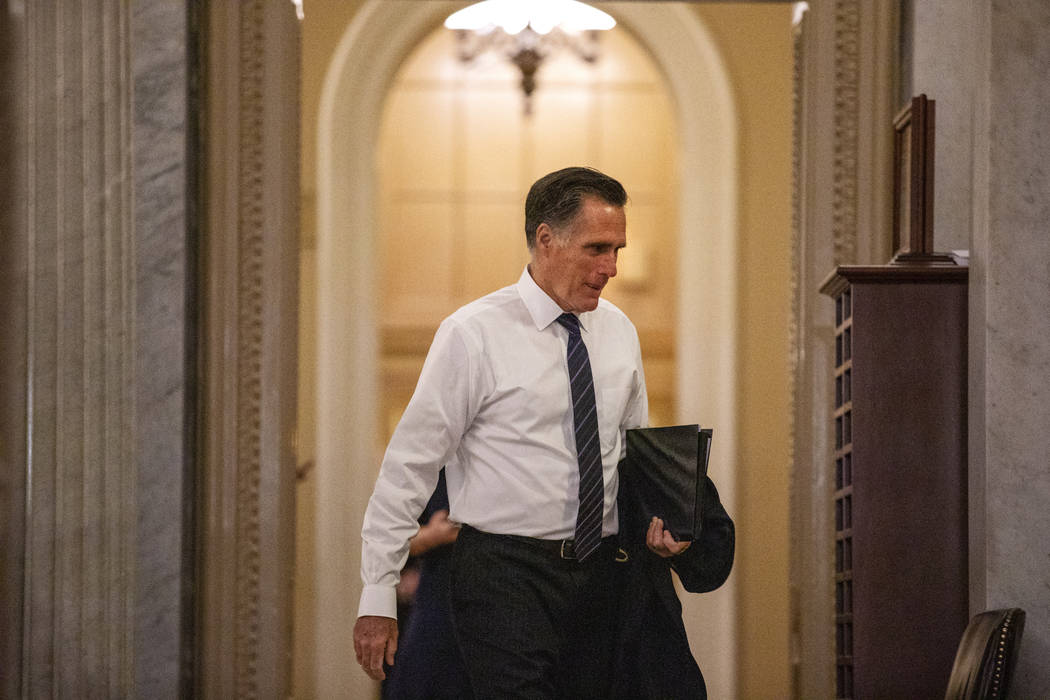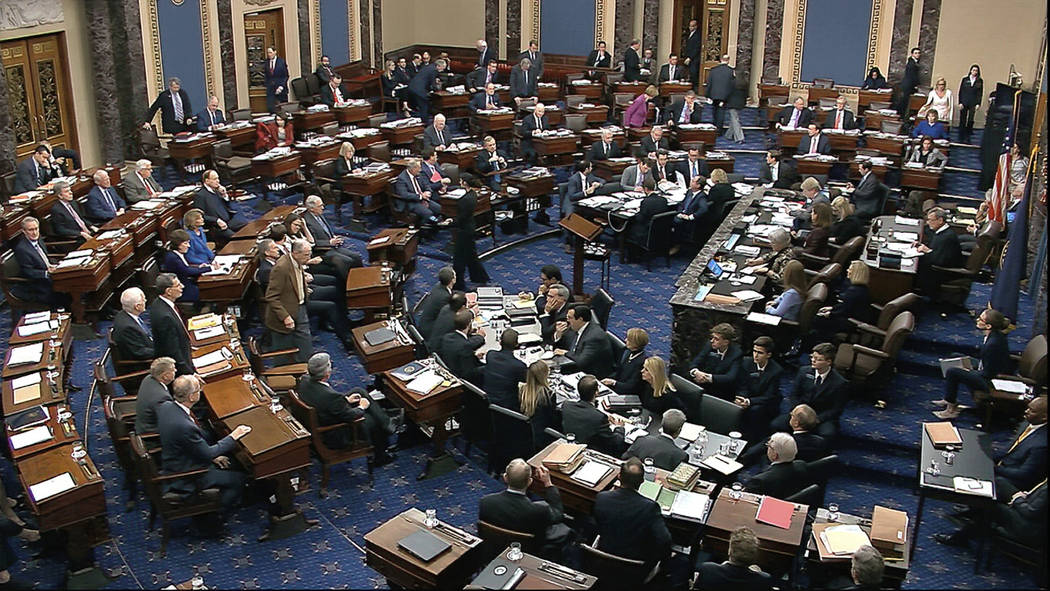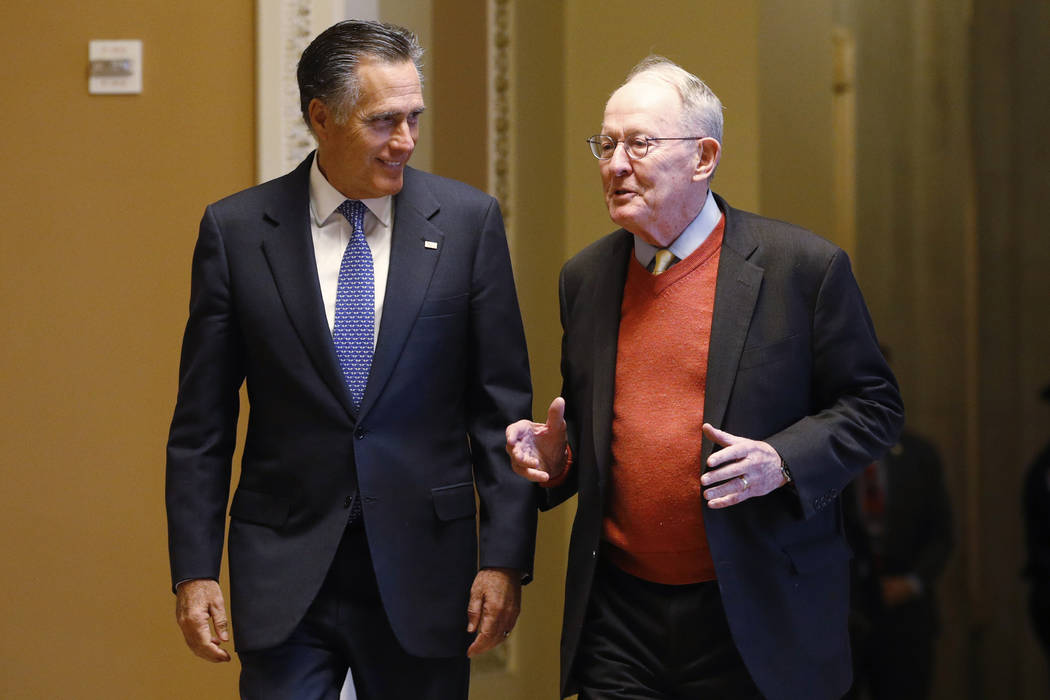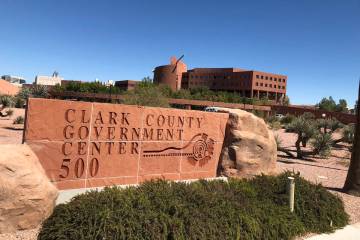Senate rejects motion to call witnesses
WASHINGTON — Republicans blocked an attempt to call witnesses and subpoena documents in the impeachment trial of President Donald Trump Friday, setting up a vote to acquit the president that will take place next week.
The vote was 51 against witnesses, 49 in favor, with two Republicans joining minority Democrats and independents who sought to hear testimony from witnesses including Trump’s former national security adviser, John Bolton. (Republicans Susan Collins of Maine and Mitt Romney of Utah voted with Democrats.)
Nevada’s two senators, Democrats Catherine Cortez Masto and Jacky Rosen, voted with party leaders who wanted not only Bolton, but acting White House chief of staff Mick Mulvaney and two other administration officials with knowledge of nearly $400 in military aid withheld from Ukraine.
Democrats accused Senate Republicans of dismissing violations of law by the president out of fear of presidential retribution, a prolonged trial during an election year and the emergence of more damaging information implicating Trump in questionable schemes.
“What the president did was so wrong,” said Senate Minority Leader Chuck Schumer, D-N.Y., in an appeal that landed on mostly deaf ears. “And there were so many people in the loop, all of whom shrugged their shoulders and went along with something that was so pointedly against the law.”
Swing Republicans vote no
Democrats’ hopes of getting the necessary four Republicans to break with their party were dashed when swing Republicans, Lamar Alexander of Tennessee and Lisa Murkowski of Alaska announced they would vote against against witnesses.
Alexander noted that not one House Republican voted for impeachment when the articles were approved in December.
“We are sadly at a low point of division in this country,” Murkowski said.
Senate Republican and Democratic leaders huddled throughout the day Friday to reach agreement on how to proceed with a vote to acquit the president, considered likely due to Trump’s popularity among GOP lawmakers. It takes 67 votes to remove a president, which would require 20 Republicans to cross party lines, assuming every Democrat and independent voted to convict.
Although conservatives wanted to stay through Friday evening to vote on acquittal, Senate Majority Leader Mitch McConnell, R-Ky., met with Schumer to strike a deal to avoid Democratic parliamentary measures that could delay proceedings.
Senators voted to return Monday for debate, and to vote on acquittal on Wednesday.
No vote ‘in dead of night’
Republicans were sensitive to Democratic claims that the GOP would acquit the president “in the dead of night” to avoid public scrutiny of their actions.
“We don’t want this rushed through,” Schumer said. “We do not want it in the dark of night.
“Members have an obligation to tell the American people and tell the people of their states why they are voting,” Schumer said.
Democrats also wanted to push back the time frame. Four senators are seeking the Democratic presidential nomination and the Iowa caucus takes place on Monday.
Trump is scheduled to deliver his State of the Union address to a joint session of Congress, and will appear before the House and Senate while under impeachment.
The president’s supporters in the Senate, and his legal team, clearly wanted to quick ending on Friday. But leaders bowed to concerns by senators on both sides who wanted to speak publicly about their votes.
The vote to reject witnesses came after days of questioning of the president’s legal team and the House managers who are prosecuting the impeachment case.
“A final verdict of acquittal would help our great country,” said White House counsel Pat Cipollone.
New precedent
But the lead House impeachment manager, Rep. Adam Schiff, D-Calif., said that if the Senate conducts a trial with no witnesses, “that will be a new precedent.”
Public opinion polls show registered voters prefered the Senate call witnesses in the impeachment trial.
Trump’s impeachment stems from a July 25 telephone call in which Trump asked Ukrainian President Volodymyr Zelenskiy to announce an investigation into political rival Joe Biden. At the time, the Trump administration was withholding nearly $400 million in military aid to Ukraine.
The president’s lawyers argued the president committed no wrongdoing, while the House impeachment team told the Senate the president was soliciting Ukraine to help cheat in his re-election. The Government Accountability Office later concluded the White House broke the law in withholding the congressionally approved aid money.
This week, a book draft by former national security adviser John Bolton claimed Trump withheld the aid to force Ukraine to announce the investigation, a quid pro quo for the self-interest of re-election. Ultimately, however, the aid was released and no investigation was ever conducted.
Bolton declined to testify before a House impeachment inquiry, but said he would appear before the Senate under subpoena.
But Republicans successfully fought to call Bolton as a witness in the trial.
Contact Gary Martin at gmartin@reviewjournal.com or 202-662-7390. Follow @garymartindc on Twitter.



